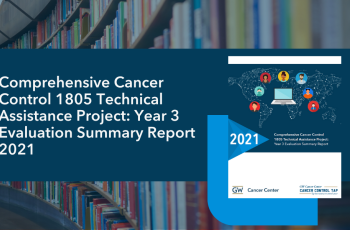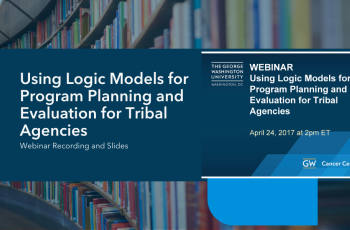This work was supported by Cooperative Agreement #NU58DP007539-01 from the Centers for Disease Control and Prevention (CDC).
Data and Evaluation
This website from the National Cancer Institute contains maps of cancer incidence and mortality that reveal the areas across the rural-urban continuum where the incidence and death rates from cancer are elevated.
This report provides a brief overview of GW Cancer Center comprehensive cancer control technical assistance project, "Building Cancer Control Capacity: Scaling Evidence to Practice to Advance Health Equity." The purpose of this summary is to give an outline of activities and progress in Year 03 (…
For 22 years, the American Lung Association has analyzed data from official air quality monitors to compile the State of the Air report.
Many CDC programs have developed evaluation materials to assist them and/or their grantees with evaluation.
This workbook was developed by the Centers for Disease Control and Prevention’s (CDC’s) Office on Smoking and Health (OSH) and Division of Nutrition, Physical Activity, and Obesity (DNPAO). This workbook was developed as part of a series of technical assistance workbooks for use by program managers…
This interactive database provides national and state-level data about the health status and behaviors of Americans as well as environmental or policy supports. Categories include breastfeeding, fruits and vegetables, physical activity, sugar drinks, television watching, and obesity/weight.…
Cancer was the second leading cause of death, after heart disease, in the United States in 2019. In 2019, there were 599,601 cancer deaths; 283,725 were among females and 315,876 among males.
To help improve policy makers and cancer control professionals’ awareness of viral hepatitis risk factors and evidence-based prevention strategies, The George Washington University Cancer Center, in collaboration with CDC, developed educational materials on viral hepatitis and liver cancer. By…
A practical, non-prescriptive tool, the evaluation framework summarizes and organizes the steps and standards for effective program evaluation.
Secure and sustainable funding is crucial for cancer control programming to flourish. Logic models can help convey to funders "why your program is important, and the logic behind why you expect it to be effective" and successful. On April 27, 2017, during National Cancer Control Month, we invited…

